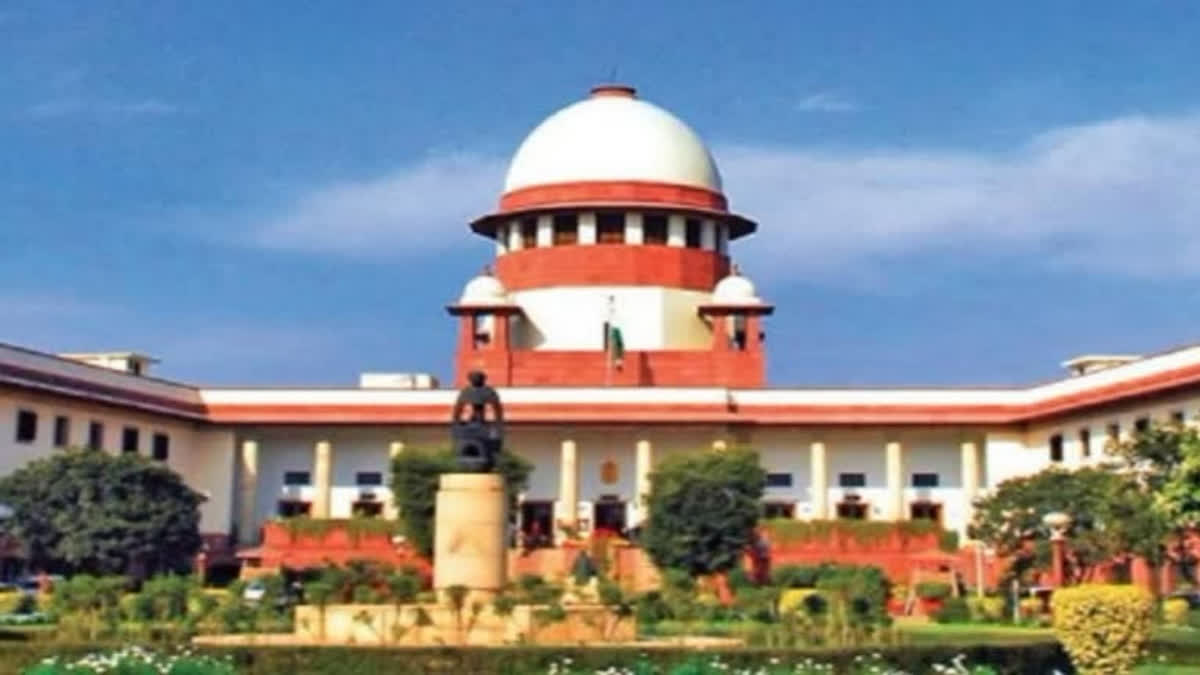New Delhi:A five-judge bench of the Supreme Court on Tuesday unanimously agreed that same-sex couples face discrimination and harassment in their daily lives and urged the government to form a High-powered Committee to expeditiously look into genuine human concerns faced by same-sex partners.
A five-judge constitution bench led by Chief Justice of India DY Chandrachud and comprising justices SK Kaul, S Ravindra Bhat, Hima Kohli and PS Narasimha, delivered the judgment on a clutch of petitions seeking legal sanction for same-sex marriage
The Chief Justice said the court records the assurance of the Solicitor General Tushar Mehta that the government will constitute a committee chaired by the Cabinet Secretary to define and elucidate the scope of the entitlements of queer couples, who are in unions. He said the committee shall include experts with domain knowledge and experience in dealing with the social, psychological and emotional needs of persons belonging to the queer community as well as members of the queer community.
The Chief Justice said the committee shall in terms of the exposition in this judgment consider the following enabling partners in a queer relationship (i) to be treated as a part of the same family for a ration card; and (ii) to have the facility of a joint bank account with the option to name the partner as a nominee, in case of death.
Also read:In 3:2 majority verdict, SC refuses the right of adoption to queer couples
“Jail visitation rights and the right to access the body of the deceased partner and arrange the last rites. Legal consequences such as succession rights, maintenance, financial benefits such as under the Income Tax Act 1961, rights flowing from employment such as gratuity and family pension and insurance," said the Chief Justice.
He said the report of the committee chaired by the Cabinet Secretary shall be implemented at the administrative level by the Central government and the governments of the states and union territories. The Chief Justice directed the Centre-state governments to ensure that the queer community is not discriminated against because of their gender identity or sexual orientation.
“Ensure that there is no discrimination in access to goods and services to the queer community, which are available to the public; take steps to sensitise the public about queer identity, including that it is natural and not a mental disorder”, he said.
The Chief Justice directed to establish and publicise the availability of ‘safe houses’ or 'Garima Grehs' in all districts to provide shelter to members of the queer community, who are facing violence or discrimination. “Ensure that inter-sex children are not forced to undergo operations with regard only to their sex, especially at an age at which they are unable to fully comprehend and consent to such operations; viii. Recognise the self-identified gender of all persons, including transgender persons, hijras and others with sociocultural identities in India, as male, female, or third gender. No person shall be forced to undergo hormonal therapy or sterilisation or any other medical procedure either as a condition or prerequisite to granting legal recognition to their gender identity or otherwise”, said the Chief Justice. Justice Kaul agreed with CJI’s opinion.
The Chief Justice also issued a slew of directions to the police and the governments to ensure that the queer community is not discriminated against because of their gender identity or sexual orientation. Justice Bhat and justice Kohli also acknowledged the discrimination faced by queer couples.
Justice Bhat, in a separate judgment, said it is important to recognise, that while the state ipso facto may have no role in the choice of two free-willed individuals to marry, its characterising marriage for various collateral and intersectional purposes, as a permanent and binding legal relationship, recognised as such between heterosexual couples only (and no others) impacts queer couples adversely.
Also read: 'No fundamental right to marry’: Here is what SC observed while refusing legal sanction to same-sex marriage
He said the intention of the state, in framing the regulations or laws, is to confer benefits to families, or individuals, who are married and this has the result of adversely impacting to exclude queer couples. “By recognising heterosexual couples’ unions and cohabitation as marriages in various laws and regulations such as: in employment (nominations in pension, provident fund, gratuity, life and personal accident insurance policies); for credit (particularly joint loans to both spouses, based on their total earning capacity); for purposes of receiving compensation in the event of fatal accidents, to name some such instances, and not providing for non-heterosexual couples such recognition, results in their exclusion”, said justice, Bhat.
Justice Bhat said the state's choice to not recognise their (social) union or relationship, is one which results in their discrimination. “This discriminatory impact – cannot be ignored, by the State; the State has a legitimate interest necessitating action. The form of action – whether it will be by enacting new umbrella legislation, amendments to existing statutes, rules, and regulations that as of now, disentitle a same-sex partner from benefits accruing to a ‘spouse’ (or ‘family’ as defined in the heteronormative sense)- are policy decisions left to the realm of the legislature and executive”, said justice Bhat.
He said the State has to take suitable remedial action to mitigate the discriminatory impact experienced by the members of the queer community, in whatever form it deems fit after undertaking due and necessary consultation from all parties, especially all State governments and Union Territories since their regulations and schemes, too, would have to be similarly examined and addressed.
